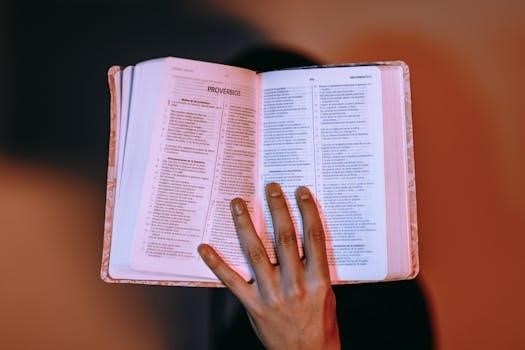The Bible frequently warns against false gods‚ emphasizing exclusive worship of the one true God. These entities‚ often idols‚ represent deities or spiritual concepts. The Old Testament details various false gods‚ highlighting the dangers of straying.

The Prohibition of Idolatry in the Bible
The Bible strictly prohibits idolatry‚ considering it a grave offense against God. Any deity other than the Lord is deemed a false god‚ and worshipping such entities is forbidden. Historically‚ idolatry carried severe penalties‚ including death. The ancient Israelites were repeatedly warned against idolatry‚ yet they frequently succumbed to it‚ incurring divine punishment.
Many biblical narratives‚ from Moses to the Babylonian captivity‚ revolve around the choice between exclusive worship of the Lord and false gods. These false gods often took the form of images or mythical figures. Some Israelites engaged in idolatrous practices‚ while the Book of Acts documents attempts to deify human beings. False gods were commonly associated with foreign nations‚ such as Amon‚ the chief god of Egypt.
The prohibition of idolatry underscores the importance of worshipping the one true God and avoiding any form of devotion to false deities.

Examples of False Gods Mentioned in the Old Testament
The Old Testament lists various false gods‚ including Baal‚ Molech‚ Ashtoreth‚ and Chemosh. These deities were often associated with foreign nations‚ tempting the Israelites to stray from their exclusive worship of the one true God.
Baal
Baal‚ a prominent deity in ancient cultures‚ frequently appears in the Old Testament as a temptation for the Israelites. Often associated with fertility and agriculture‚ Baal worship involved rituals that directly contradicted the monotheistic teachings of the Lord. The Israelites were warned against adopting Baal’s practices‚ which included idolatry and immoral acts.
The prophets‚ like Elijah‚ vehemently opposed Baal worship‚ emphasizing the exclusive devotion owed to the one true God. Stories in the Bible depict the conflict between those faithful to the Lord and those seduced by the allure of Baal. The consequences of turning to Baal were severe‚ leading to divine judgment and national disaster. Baal represents a constant challenge to the Israelites’ fidelity and faith.
The allure of Baal stemmed from promises of prosperity and abundance‚ appealing to the Israelites’ desire for material well-being. This highlights the ongoing struggle between spiritual devotion and worldly temptations in the biblical narrative.
Molech
Molech stands out as one of the most abhorrent false gods mentioned in the Old Testament. Worship of Molech was associated with child sacrifice‚ a practice explicitly condemned by God. The act involved burning children as offerings‚ demonstrating extreme devotion and appeasement to this deity. The Bible sternly warns the Israelites against participating in such rituals.
Leviticus directly prohibits giving children to Molech‚ declaring it a defilement of God’s holy name. The severity of the condemnation underscores the profound violation of human life and divine law. Kings who embraced Molech worship led the Israelites into deep sin‚ incurring God’s judgment.
Molech symbolizes the depths of depravity to which idolatry can lead‚ highlighting the contrast between the sanctity of life and the cruelty of false worship. The memory of Molech serves as a stark reminder of the moral dangers inherent in turning away from the one true God and embracing false deities.
Ashtoreth
Ashtoreth‚ also known as Astarte‚ was a prominent Canaanite goddess associated with fertility‚ love‚ and war. Her worship often involved sensual rituals and practices‚ which stood in stark contrast to the moral standards prescribed by the God of Israel. The Israelites‚ despite repeated warnings‚ were frequently drawn into the worship of Ashtoreth‚ leading to spiritual and moral decline.
The Bible mentions Ashtoreth as one of the false gods that seduced the Israelites away from their covenant with God. Temples and high places were erected in her honor‚ where illicit ceremonies were performed. The influence of Ashtoreth extended throughout the region‚ impacting the religious landscape and challenging the exclusive devotion demanded by God.
Ashtoreth represents the allure of worldly desires and the temptation to compromise spiritual integrity for fleeting pleasures. Her presence in the biblical narrative serves as a cautionary tale against syncretism and the dangers of blending pagan practices with true worship. The struggle against Ashtoreth underscores the ongoing battle for the hearts and minds of God’s people.
Chemosh
Chemosh was the national god of the Moabites‚ an ancient people who frequently clashed with the Israelites. He was primarily a deity of war‚ and his worship often involved human sacrifice‚ a practice abhorrent to the God of Israel. The Moabites believed that offering their children to Chemosh would ensure his favor and protection in battle.
The Bible describes Chemosh as an abomination‚ highlighting the stark contrast between his brutal rituals and the righteous demands of the one true God. King Solomon‚ in a moment of weakness‚ even built a high place for Chemosh outside Jerusalem‚ demonstrating the pervasive influence of pagan worship on the Israelites.
Chemosh symbolizes the destructive nature of false gods and the extreme measures people will take to appease them. His presence in the biblical narrative serves as a reminder of the depravity that can result from turning away from God and embracing idolatry. The condemnation of Chemosh underscores the importance of rejecting all forms of pagan worship and remaining steadfast in devotion to the Lord.
Ancient Egyptian Gods and the Hebrews
Ancient Egypt had more than 40 false gods. The Hebrews weren’t tempted by these gods. These included Re‚ Isis‚ Osiris‚ and Horus. The plagues affected the Egyptians physical senses and hearts.
Re
Re‚ also known as Ra‚ held a paramount position in the ancient Egyptian pantheon as the sun god. Represented with the head of a falcon and a sun disk atop his head‚ Re symbolized light‚ warmth‚ and life itself. Egyptians believed Re journeyed across the sky daily in his solar barque‚ battling the serpent Apophis each night to ensure the sun’s return.
The Hebrews‚ during their time in Egypt‚ would have been well aware of Re’s significance. Re was central to Egyptian culture. While the Bible doesn’t explicitly mention Re‚ his prominence in Egyptian society would have presented a stark contrast to the Hebrew’s monotheistic faith‚ emphasizing the singular worship of Yahweh.
Isis
Isis‚ a prominent goddess in ancient Egyptian mythology‚ was revered as the goddess of magic‚ motherhood‚ protection‚ and healing. Often depicted with wings‚ she was associated with powerful spells and the ability to resurrect the dead. Her cult spread throughout the Roman Empire.
The Hebrews’ extended presence in Egypt meant they were undoubtedly familiar with Isis and her widespread worship. Isis was central to Egyptian religious practices. The Bible does not directly reference Isis by name‚ her pervasive influence in Egyptian culture would have posed a significant temptation for the Israelites. This would be a test of their faith and their commitment to Yahweh. The allure of magic and divine power embodied by Isis would have challenged their devotion to monotheism.
Osiris
Osiris‚ a central figure in ancient Egyptian mythology‚ reigned as the lord of the afterlife‚ resurrection‚ and fertility; He was often depicted as a mummified pharaoh‚ symbolizing his role in the cycle of death and rebirth. Egyptians believed that after death‚ they would journey to Osiris’s kingdom.
While the Bible does not explicitly mention Osiris‚ the Hebrews’ long sojourn in Egypt exposed them to the widespread veneration of this deity. The concept of an afterlife ruled by Osiris was deeply ingrained in Egyptian culture. This would present a stark contrast to the Hebrew understanding of God. The prevalence of Osiris worship would have posed a challenge to the Israelites’ monotheistic faith‚ testing their resolve to remain devoted to Yahweh alone.
Horus
Horus‚ a falcon-headed god‚ held a prominent position in the ancient Egyptian pantheon. Revered as the god of the sky‚ kingship‚ and protection‚ Horus was often depicted with the Eye of Horus‚ a powerful symbol of healing and restoration. Egyptians believed that the pharaoh was the living embodiment of Horus.
Although the Bible doesn’t directly name Horus‚ the Israelites’ extended stay in Egypt exposed them to the widespread worship of this deity. The association of Horus with kingship and power would have been particularly significant‚ given the Hebrews’ own aspirations for nationhood. The contrast between the deified pharaoh‚ representing Horus‚ and the Hebrew concept of a divinely appointed leader would have presented a theological challenge‚ underscoring the distinct nature of their faith.

Consequences of Worshiping False Gods
The Bible unequivocally condemns the worship of false gods‚ outlining severe consequences for those who stray from the one true God. These consequences extend beyond the spiritual realm‚ impacting both individual lives and the fate of entire nations.
Deuteronomy 28 vividly describes the curses that would befall the Israelites if they turned to other gods‚ including disease‚ famine‚ defeat in battle‚ and exile. The Old Testament narratives provide numerous examples of these consequences being realized as the Israelites repeatedly succumbed to idolatry.
Worshiping false gods is depicted as spiritual adultery‚ breaking the covenant relationship between God and His people. It leads to moral decay‚ social injustice‚ and a loss of divine protection. Ultimately‚ it separates individuals and nations from God’s blessings‚ leading to destruction and despair‚ as the Bible warns.
Biblical Verses Condemning False Gods
The Bible is replete with verses that unequivocally condemn the worship of false gods‚ emphasizing the exclusive devotion owed to the one true God. Exodus 20⁚3‚ the first commandment‚ declares‚ “You shall have no other gods before me‚” establishing the foundation for monotheistic worship.
Deuteronomy 6⁚14 warns against following “other gods‚ the gods of the peoples around you‚” highlighting the temptation to adopt foreign deities. Psalm 96⁚5 proclaims‚ “For all the gods of the nations are idols‚ but the LORD made the heavens‚” contrasting the powerlessness of idols with the omnipotence of God.
Isaiah 44⁚9 denounces those who make idols as “nothing‚” emphasizing the worthlessness of these creations. Revelation 21⁚8 lists “idolaters” among those who will face eternal judgment‚ underscoring the severity of this transgression. These verses collectively paint a clear picture of God’s abhorrence of false worship.
False Prophets and Deception
The Bible cautions against false prophets‚ individuals who claim divine authority but spread deceitful teachings‚ leading people astray. These individuals often exploit vulnerabilities‚ promising instant gratification while diverting followers from genuine faith. 1 John 4⁚1 urges believers to “test the spirits to see whether they are from God‚” emphasizing the need for discernment.
Deuteronomy 13⁚1-5 warns against prophets who advocate following other gods‚ even if they perform signs and wonders. Matthew 7⁚15 cautions about “false prophets‚ who come to you in sheep’s clothing but inwardly are ravenous wolves‚” highlighting their deceptive nature.
These verses underscore the importance of critical evaluation and adherence to established scriptural teachings. False prophets use charisma and manipulation‚ so believers must ground themselves in truth‚ seeking guidance from the Holy Spirit.

The One True God vs. False Gods
The Bible contrasts the one true God with false gods‚ emphasizing His unique attributes and authority. Psalm 96⁚5 declares‚ “For all the gods of the nations are idols‚ but the LORD made the heavens‚” highlighting the Creator’s superiority over fabricated deities. Isaiah 42⁚8 states‚ “I am the LORD; that is my name! I will not yield my glory to another‚” underscoring God’s exclusive claim to worship.
False gods‚ often represented by idols‚ are portrayed as powerless and incapable of providing true salvation or guidance. 1 Corinthians 8⁚4 asserts‚ “We know that an idol is nothing at all in the world and that there is no God but one‚” exposing their inherent emptiness.
Choosing the one true God involves rejecting idolatry and embracing a relationship built on truth‚ trust‚ and genuine devotion. This commitment brings fulfillment.

No Responses